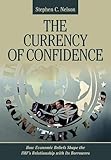The Currency of Confidence : How Economic Beliefs Shape the IMF's Relationship with Its Borrowers / Stephen C. Nelson.
Material type: TextSeries: Cornell Studies in MoneyPublisher: Ithaca, NY : Cornell University Press, [2017]Copyright date: ©2017Description: 1 online resource (248 p.)Content type:
TextSeries: Cornell Studies in MoneyPublisher: Ithaca, NY : Cornell University Press, [2017]Copyright date: ©2017Description: 1 online resource (248 p.)Content type: - 9781501708305
- Financial crises
- Loans, Foreign
- Neoliberalism
- General Economics
- Political Science & Political History
- Public Policy
- POLITICAL SCIENCE / Political Economy
- IMF, International Monetary Fund, politics of IMF, neoliberalism, conditional lending arrangements, financial assistance, public confidence, economic relationships, macroeconomics
- 332.1/52 23
- online - DeGruyter
| Item type | Current library | Call number | URL | Status | Notes | Barcode | |
|---|---|---|---|---|---|---|---|
 eBook
eBook
|
Biblioteca "Angelicum" Pont. Univ. S.Tommaso d'Aquino Nuvola online | online - DeGruyter (Browse shelf(Opens below)) | Online access | Not for loan (Accesso limitato) | Accesso per gli utenti autorizzati / Access for authorized users | (dgr)9781501708305 |
Browsing Biblioteca "Angelicum" Pont. Univ. S.Tommaso d'Aquino shelves, Shelving location: Nuvola online Close shelf browser (Hides shelf browser)
Frontmatter -- Contents -- Tables and Figures -- Acknowledgments -- 1. Understanding the IMF and Its Borrowers -- 2. How Shared Economic Beliefs Shape Loan Size, Conditionality, and Enforcement Decisions -- 3. Playing Favorites: Quantitative Evidence Linking Shared Economic Beliefs to Variation in IMF Treatment -- 4. Argentina and the IMF in Turbulent Times, 1976–1984 -- 5. From One Crisis to the Next: IMF-Argentine Relations, 1985–2002 -- 6. Staying Alive: IMF Lending Programs and the Political Survival of Economic Policymakers -- 7. Implications, Extensions, and Speculations: The IMF and Its Borrowers, in and out of Hard Times -- References -- Index
restricted access online access with authorization star
http://purl.org/coar/access_right/c_16ec
The IMF is a purposive actor in world politics, primarily driven by a set of homogenous economic ideas, Stephen C. Nelson suggests, and its professional staff emerged from an insular set of American-trained economists. The IMF treats countries differently depending on whether that staff trusts the country's top officials; that trust in turn depends on the educational credentials of the policy team that Fund officials face across the negotiating table. Intellectual differences thus lead to lasting economic effects for the citizens of countries seeking IMF support.Based on deep archival research in IMF archives and personnel files, Nelson argues that the IMF has been the Johnny Appleseed of neoliberalism: neoliberal policymakers sprout and take root in countries that have spent recent decades living under the Fund’s conditional lending arrangements. Nelson supports his argument through quantitative measures and illustrates the dynamics of relations between the Fund and client countries in a detailed examination of newly available archives of four periods in Argentina’s long and often bitter relations with the IMF. The Currency of Confidence ends with Nelson’s examination of how the IMF emerged from the global financial crisis as an unexpected victor.
Mode of access: Internet via World Wide Web.
In English.
Description based on online resource; title from PDF title page (publisher's Web site, viewed 26. Apr 2024)









